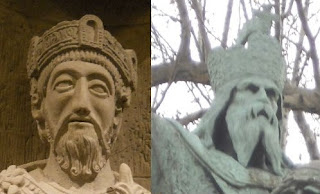 Quick, name a Cuban artist. Yeah, before coming here I could not have named one either. Of course, that does not mean all that much. There are lots of countries whose artists I could not name. It does not necessarily mean anything about the quality of their art. After visiting the Museum Nacional de Bellas Artes, I think it may say more about the quality of Cuba's artists' promotional talent than of their art.
Quick, name a Cuban artist. Yeah, before coming here I could not have named one either. Of course, that does not mean all that much. There are lots of countries whose artists I could not name. It does not necessarily mean anything about the quality of their art. After visiting the Museum Nacional de Bellas Artes, I think it may say more about the quality of Cuba's artists' promotional talent than of their art. And it's not just me. On my way to the museum, I paused to check my map (always a risk, this time it cost me three CUC). Swiftly, someone came to my aid: "Donde vas?". I told them I was on my way to the art museum - which just happened to be the way they were headed. Only we were not headed to the same museum. In Havana, there are two art museums located just a couple blocks from each other. My 'friend' assumed I was headed to the 'good one' a collection described as 'universal art'. Basically, it is European stuff confiscated from rich Cubans after the revolution. I had to convince my new friend that I knew what I was doing. I really did want to visit the museum of Cuban art. I'm not sure my friend or any other Cubans have ever visited the Cuban art museum. I suspect they doubt anything Cuban could rival all that stuff by famous foreigners - but it does.
And it's not just me. On my way to the museum, I paused to check my map (always a risk, this time it cost me three CUC). Swiftly, someone came to my aid: "Donde vas?". I told them I was on my way to the art museum - which just happened to be the way they were headed. Only we were not headed to the same museum. In Havana, there are two art museums located just a couple blocks from each other. My 'friend' assumed I was headed to the 'good one' a collection described as 'universal art'. Basically, it is European stuff confiscated from rich Cubans after the revolution. I had to convince my new friend that I knew what I was doing. I really did want to visit the museum of Cuban art. I'm not sure my friend or any other Cubans have ever visited the Cuban art museum. I suspect they doubt anything Cuban could rival all that stuff by famous foreigners - but it does. 
It is an enormous collection (revolutions are great for art museums) laid out on two floors, in four wings. It spans more than a century of the work of Cuban artists. The vision and technique are excellent. It is apparent that Cuban artists trained seriously and followed the trends of their European counterparts. There is classical, Impressionist, Cubist, abstract - the whole range, yet most of it with a Caribbean or Cuban slant. They have some great stuff and sadly, a no picture policy. One of the guards said I would find copies of a bunch of the work in the store downstairs but alas, it was not so. It seems the only thing that Cuba is good at merchandising is Ché and this was no exception. The shop had more postcards of him than of the art upstairs. (I found some on-line though, somebody was sneakier than I am).
There was one element of particular note: that is the collection of José Marti themed paintings. Marti is, of course, Cuba's national hero and this is a state museum. So, where's the surprise that Fidel would include political art? The surprise was in the date of the work and the painters who created them. They pre-date Fidel by decades and speak to the almost timeless appeal Marti and his values have for Cubans. I expect long after traces of Fidel have disappeared, Fidel's monuments to Marti will remain.














































